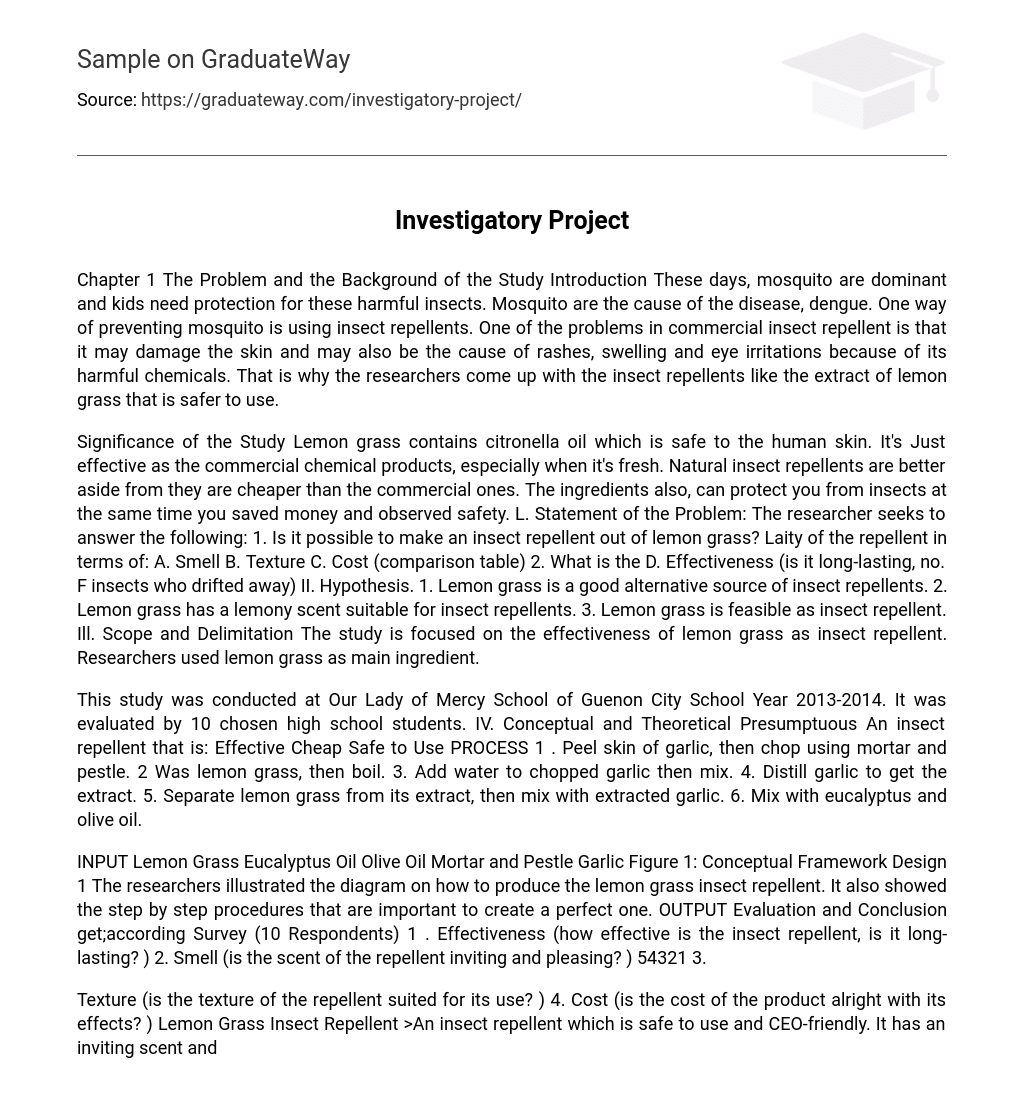Introduction
These days, mosquito are dominant and kids need protection for these harmful insects. Mosquito are the cause of the disease, dengue. One way of preventing mosquito is using insect repellents. One of the problems in commercial insect repellent is that it may damage the skin and may also be the cause of rashes, swelling and eye irritations because of its harmful chemicals. That is why the researchers come up with the insect repellents like the extract of lemon grass that is safer to use.
Significance of the Study Lemon grass contains citronella oil which is safe to the human skin. It’s Just effective as the commercial chemical products, especially when it’s fresh. Natural insect repellents are better aside from they are cheaper than the commercial ones. The ingredients also, can protect you from insects at the same time you saved money and observed safety.
Scope and Delimitation
The study is focused on the effectiveness of lemon grass as insect repellent. Researchers used lemon grass as main ingredient. This study was conducted at Our Lady of Mercy School of Guenon City School Year 2013-2014. It was evaluated by 10 chosen high school students.
Conceptual and Theoretical Presumptuous
An insect repellent that is: Effective Cheap Safe to Use PROCESS
- Peel skin of garlic, then chop using mortar and pestle.
- Was lemon grass, then boil.
- Add water to chopped garlic then mix.
- Distill garlic to get the extract.
- Separate lemon grass from its extract, then mix with extracted garlic.
- Mix with eucalyptus and olive oil.
INPUT Lemon Grass Eucalyptus Oil Olive Oil Mortar and Pestle Garlic Figure 1: Conceptual Framework Design 1 The researchers illustrated the diagram on how to produce the lemon grass insect repellent. It also showed the step by step procedures that are important to create a perfect one. OUTPUT Evaluation and Conclusion get;according Survey (10 Respondents)
- Effectiveness (how effective is the insect repellent, is it long-lasting? )
- Smell (is the scent of the repellent inviting and pleasing? )
- Texture (is the texture of the repellent suited for its use? )
- Cost (is the cost of the product alright with its effects? )
Definition of Terms
- Repellent- Particularly an insect repellent, is a substance applied to the skin, clothing, or other surfaces which discourage insects.
- Dengue- Dengue fever is a painful, debilitating, mosquito-borne disease caused by any one of four closely related dengue viruses.
- Citronella Oil- It is one of the essential oils obtained from the leaves and stems of different component (lemon grass).
- Eucalyptus Oil- an essential oil obtained from the leaves of eucalyptus.
- Olive Oil- oil pressed from pipe olives, used in cooking, medicines, soap, etc.
- Aides- mosquitoes that cause dengue or yellow-fever.
- Currycomb Cacciatore- is a tall tree, to 51 meters in height, from temperate and tropical north eastern Australia. It is also known as lemon-scented gum, blue spotted gum and lemon eucalyptus.
- Component (lemongrass) – is a genus of about 55 species of grasses, native to warm temperate and tropical regions of the Old World and Oceania. It is a tall perennial grass.
- Planetarium Citreous- a species of geranium known as citronella plant or ‘mosquito plant’.
- Insecticides- a substance used for killing insects.





